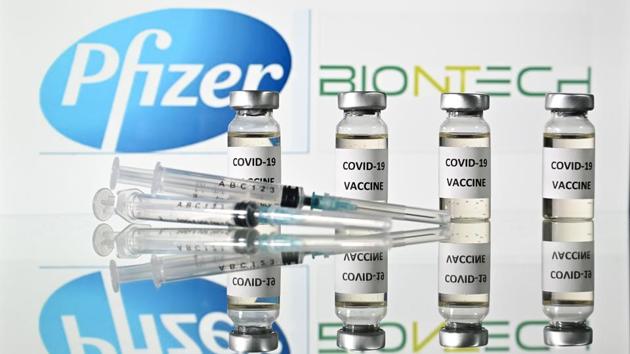Covid-19: What you need to know today
The UK, which has a patchy record in managing the coronavirus disease — it was, after all, the first country to decide to bank on herd immunity before it realised the folly of the approach — became the third country (after China and Russia) and the first Western one to approve a vaccine for Covid-19.
The UK, which has a patchy record in managing the coronavirus disease — it was, after all, the first country to decide to bank on herd immunity before it realised the folly of the approach — became the third country (after China and Russia) and the first Western one to approve a vaccine for Covid-19.

China has approved three vaccines for emergency use; Russia, two. The UK’s regulatory approval for the mRNA vaccine developed by Pfizer Inc and BioNTech SE came on Wednesday, and the first shots of the vaccine are likely to be administered as early as the end of next week. The UK has said it is expecting deliveries of 800,000 of the 40 million doses of the vaccine it has ordered, next week. The Pfizer/BioNTech vaccine is a two-dose one that needs to be stored at Antarctic temperatures (which also means the vaccines can’t be moved around too much), which means the UK may well be able to vaccinate 400,000 of its people from the first delivery. Analysts expect the country to receive a few million doses of the vaccine this year; the shots will be administered by the UK’s National Health Service. The UK has firm agreements with a clutch of vaccine makers for around 350 million doses, which should be adequate for a country of 67 million.
Thus, a country that did almost everything wrong at the start of the pandemic has emerged at the vanguard of countries poised to get the better of the disease as the world enters 2021, a year that will be defined by vaccines and vaccination efforts, almost as much as 2020 was by the Sars-Cov-2 virus and Covid-19.
There’s been some confusion over India’s own vaccine plans, which too have gathered steam — the country is betting on the Astra Zeneca/Oxford vaccine, made in Pune by Serum Institute of India; the UK too has a large order with AstraZeneca, for around 100 million doses, and is pressing ahead with regulatory approval of the vaccine, which released trial data that has come in for some scrutiny (and may well prevent the US drug regulator, for instance, from approving the vaccine in that country). There is a trial of this vaccine on in India as well (although the country can approve the vaccine based on the results of its UK/Brazil trial that have been released) but the confusion doesn’t stem from that front — it comes from an almost throwaway comment by health secretary Rajesh Bhushan on Tuesday, that the Indian “government never spoke about vaccinating the entire country”.
The comment, which has been followed by radio silence, at least on his part, goes against what Prime Minister Narendra Modi said — that all Indians will be vaccinated. Sure, Indian Council of Medical Research chief Balram Bhargava (who was at the same briefing as Bhushan) sought to explain the health secretary’s comment by saying that the purpose of vaccination is to “break the chain of infection”, and that “if we are able to vaccinate a critical mass of people and break the virus transmission, we may not have to vaccinate the entire population”.
It’s important to clarify that the coronavirus vaccines being developed are not for everyone. They are for adults only. None of the vaccine trials thus far, bar one, has been on anyone under the age of 18 years. The exception is the Pfizer/BioNTech trial that, in September, recruited children who were 15-17 years old (in October, it recruited more children, some as young as 12). But the results of this part of the trial are still not out. And it is unlikely that Bhushan had this nuance in mind when he said what he did.
As for Bhargava’s explanation, while technically correct, it is perhaps only marginally less dangerous than the UK’s original herd-immunity strategy. This is not how you crush a pandemic as infective and as debilitating to body, spirit, and the economy as Covid-19.
There’s also a scientific basis for vaccinating everyone. As Eric Topol and Dennis Burton of The Scripps Research Institute, La Jolla, California wrote recently in Nature Medicine, at the end of a brief but illuminating note that discussed natural and vaccine-based immunity: “Overall, we are optimistic, given the number of platforms being investigated and the huge ongoing efforts, that a vaccine (or vaccines) against COVID-19 with immune responses and protection superior to that achieved through natural infection is an achievable goal.”
While, as the authors say, more data from the trials as well of infections is needed, questions remain on the extent of natural immunity of people who were infected but remained asymptomatic. Leaving it to nature is a risk the world can’t afford to take.
Universal vaccination is the only solution.
Get Current Updates on India News, Lok Sabha Election 2024 live, Infosys Q4 Results Live, Elections 2024, Election 2024 Date along with Latest News and Top Headlines from India and around the world.



